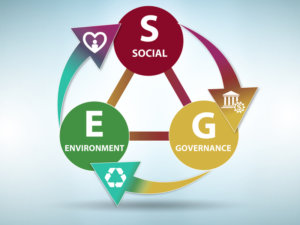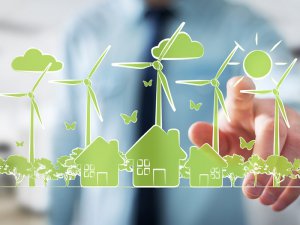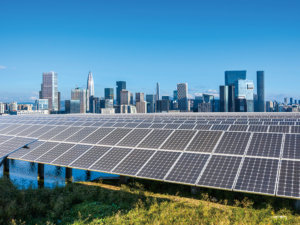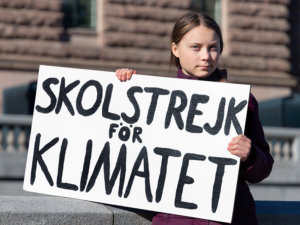気候変動リスクに対峙する金融機関の責任と行動とは。
2020/10/09

気候変動による甚大な被害を受け、緊急提言が発表された。社会の変化に即して求められる、金融機関の在り方や責任とは。国連環境計画金融イニシアティブの特別顧問である末吉竹二郎氏に話を聞いた。
負うべき2つの社会的責任
金融機関が存在する理由とは
そもそも金融機関は、社会に対して2つの特別な責任を負っています。1つは「金融ライセンス」。金融機関が他業種と異なる営業活動を許されているのは、この特別な保護があればこそ。
では、このライセンスはいったい誰に付与されたのか。一義的には金融庁(国)ですが、その背後にはあるのは社会そのもの。つまり、「金融ライセンスを付与したのは社会そのもの」なのです。つまり、金融機関はその始めから、ライセンスを付与してくれた社会に対して責任を負っているのです。
もう1つは、金融機関が扱うお金は「金融機関のお金ではない」ということ。
例えば、銀行預金は顧客から預かったお金であり、年金基金なら年金加入者のお金です。つまり「金融機関が扱うお金は社会のお金」であり、金融機関はお金の持ち主である社会のためになるよう、資金を還流するのが理の当然です。
それを念頭に置けば、社会が脱炭素に向けば当然、脱炭素化に向けた金融活動が求められる。もし社会の認識が遅れているのであれば、金融機関はむしろ、社会に対して一歩前に出て脱炭素化に向けた金融を行うべき立場にある、とさえいえるのです。
社会の審査機関として
空前の改革を支援しよう
金融活動の基盤である産業や経済、それに社会が崩壊すれば、そもそも金融機関が存在することは不可能です。地球環境が悪化する中、金融機関は自己防衛のためにも脱炭素化に対して金融を付すべきなのは明らかでしょう。
以上から、金融機関は“社会のお金を社会のために流す”ためにも、「社会のための審査機関である」という自覚が不可欠です。
次に、気候変動への「緩和」と「適応」について。
「緩和」については、CO2排出事業からお金を引き揚げる「ダイベストメント」があり、すでに年金基金や投資銀行などが化石燃料関連の事業から資金を引きあげています。逆にCO2削減事業に多くの資金を回す一例が、再生可能エネルギーへの巨額投資です。
「適応」については、自然災害に強い都市づくり、洪水から住宅を守るためのインフラ整備などへの金融支援が考えられます。加えて被害者支援として、新しい損害保険の開発も重要です。
21世紀の社会をリードするのは「SDGs」と「パリ協定」。これらの国際協定が目指す持続可能な社会へのシフトこそが、地球社会が直面する大事業です。社会のもっとも基礎的なインフラである金融機能を通じて、「持続可能な開発のための2030アジェンダ」にある通り、“世界を変える”(Transforming our world)空前絶後の社会改革を支援することこそ、21世紀の金融機関の最大の使命といって過言ではありません。
今、金融機関が最大限お金を回すべきなのは、以下の5つ、①ネットゼロエミッションへの産業構造の転換、②スマートシティの建設を通じた少子高齢化・過疎地域の活性化、③新しい価値観と国際性を持ち、21世紀にふさわしいライフスタイルを実践する若者を育てる教育部門(SDGs学部の創設など)、④途上国を支援する国際協力部門、⑤イノベーションを事業化するベンチャーキャピタル的金融の拡大です。
日本が取り残されないために
問われる地域金融の意義
昨今の気候変動による水害等の自然災害対策、農林水産業対策等は、自治体との連携が欠かせないため、特に地域金融機関は金融行動を加速させるべきです。
地域金融機関のミッションは、その地域を活性化させること。地域が活性化されてこそ、地域金融機関の好業績には意義がある。地域経済が廃れる中で地域金融機関だけ栄えるのは、本末転倒です。
そのためにも、SDGsの活用方法を再確認していただきたい。SDGsで掲げる17の目標を地域に当てはめ、地域金融機関が我がこととして地域の問題解決に当たる。地域金融機関は自らがリーダーシップをとり、地域のステークホルダー全体に呼びかけて地域の在り方を変革する意気込みで取り組まねばなりません。地域金融機関レベルまで、もっと真剣に、より率直に、地球社会が直面する問題に向き合う必要があるのです。
現在、日本政府は、依然として石炭火力を増やすなど、再エネ促進に背を向けています。金融機関は、政府の姿勢に唯々諾々と従うのではなく、世界の潮流を自らの目で捉え、強い批判精神をもってゼロエミッションに進まなければなりません。さもなくば、日本は世界の中で十年後れの国になってしまう。本当に日本が世界と踵を接して地球的課題の解決に取り組むのであれば、早い段階での水面下の「アヒルの水掻き」的努力を決して惜しまないことです。
21世紀金融行動原則の緊急提言
1 金融の安定性の維持に万全の注意を払うこと=金融機関の最大の社会的責任
⇒気候リスク管理とそれに基づく適切な行動を推進する必要がある。
2 金融機関は「緩和」と「適応」の意図を鮮明にした金融行動をとるべきである。
3 自然災害対策や農林水産業対策等のために自治体と連携を強化
⇒地域金融機関においてはより一層、資金提供を加速させるべきである。
※上記は金融行動原則HPより編集部が抜粋、修正して作成。
PROFILE
国連環境計画金融イニシアティブ
特別顧問
末吉 竹二郎氏

The Responsibilities And Actions Of Financial Institutions That Confront The Climate Change Risks
An Urgent proposal has been announced under the enormous damage by climate change. What is the required role and responsibility of financial institutions for social change? We have interviewed Mr, Takejiro Sueyoshi, the special adviser of UNEP Finance Initiative for the opinion.
Text: Kosuke Oneda
UNEP(United Nations Environment Programme) Finance Initiative
Special Adviser
Takejiro Sueyoshi
The Two Social responsibilities That Are Required Of Financial Institutions
Originally, financial institutions have two significant social responsibilities to take. The first one is “Financial License”. It is because of this special protection that financial institutions are allowed to conduct business activities different from other industries. Then, by whom the license was given? Primarily, it was by Financial Services Agency (Nation). However, to be precise it was given by society. In other words, “The society itself gave Financial License to them”, which means financial institutions are responsible for the society from the beginning. The other responsibility is that the money that financial institutions handle is not “The money owned by financial institutions”. For example, deposits are the money the customers own and pension funds are the money of the pension members. Therefore, “The money that financial institutions handle is the money of the society”, and it’s only natural that they should return the money to the society for good. When you think of that, then it is easy to understand that if the society is working on the decarbonization, they will be asked to work towards that way. Moreover, if the recognition of society is behind the standard, they should take the lead and actions towards decarbonization.
As The Examine Authority Of The Society Support The Unprecedented Revolution
It is impossible for financial institutions to survive if the foundation of the financial activities such as industries, economics, and social collapse. In the current situation that the global environment is getting worse, it is clear that financial institutions should conduct financial activities towards the decarbonization for their own self-defense. From these reasons, it is essential for financial institutions to have the awareness as “The examining authority for the society” to return the money back to society for good. The topics of “Mitigation” and “Adaptation” for climate change are as follow; Regards to “Mitigation”, there is “Divestment”, which is to withdraw the money from the projects that emit CO2. Pension funds and investment banks have already been retreated from those fossil-fuel related business. On the other hand, the massive capital investment for renewable energy is one of the examples of CO2 reduction projects. As for “Adaptation”, we can think of the financial backing for the urban development that is resistant to natural disaster, or the infrastructure improvement to protect houses from floods and so on. In addition, the new property insurance for victims’ support will be important, too. “SDGs” and “Paris Agreement” will lead the 21st-century society. The shift towards the sustainable society that those international agreements aim at will be the big project that the whole universe will confront. It is no exaggeration to say that the most important mission for financial institutions in 21st century is that to support “Transforming our world: the 2030 Agenda for Sustainable Development”, the unprecedented social revolution through financial function which is the most basic infrastructure of society. Here are 5 things financial institutions should invest bundle on now; 1, Transformation of industry structure for net-zero emission 2, Smart city construction for the activation of decreasing birthrate and aging of the population & underpopulated area 3, Education departments for young people that practice the 21st century lifestyle with a new sense of value and internationality (such as the establishment of SDGs department, etc.) 4, International cooperation department to support developing countries 5, Expansion of venture capital finance for innovation enterprises
The Role Of Regional Financial Institution For Not To Be Left Behind
Especially, regional financial institutions should accelerate their financial activities since the cooperation with local government is vital to take measures for the natural disaster such as flood damage in recent years and agricultural forestry industries & fishers. The mission of regional financial institutions is to activate their local areas. With the activation of local areas, the successful results of institutions can have true meaning. If local areas are decaying when those institutions are flourishing, that means they are mistaking the means for the end. With this view, I suggest reconfirming the good method of SDGs. Apply the 17 goals of SDGs to the local areas, and regional financial institutions tackle the problems as the leader. They should address the local stakeholders to work on the innovation of areas. We have to face global problems more seriously and directly down to regional financial institution levels. The Japanese government is still increasing coal-fired powers, and turning its back on the acceleration for renewable energy. Financial institutions should not just take the orders from the government without thinking, but see the world from own points of view to take actions towards zero-emission with critical attitudes. Otherwise, Japan will be left behind from the world for 10 years. If Japan really wants to tackle the global problems with the world, it’s better to keep making “the duck’s web” efforts from the early stage.
取材・文/大根田康介
RE JOURNAL vol.2(2019-20年冬号)より転載












